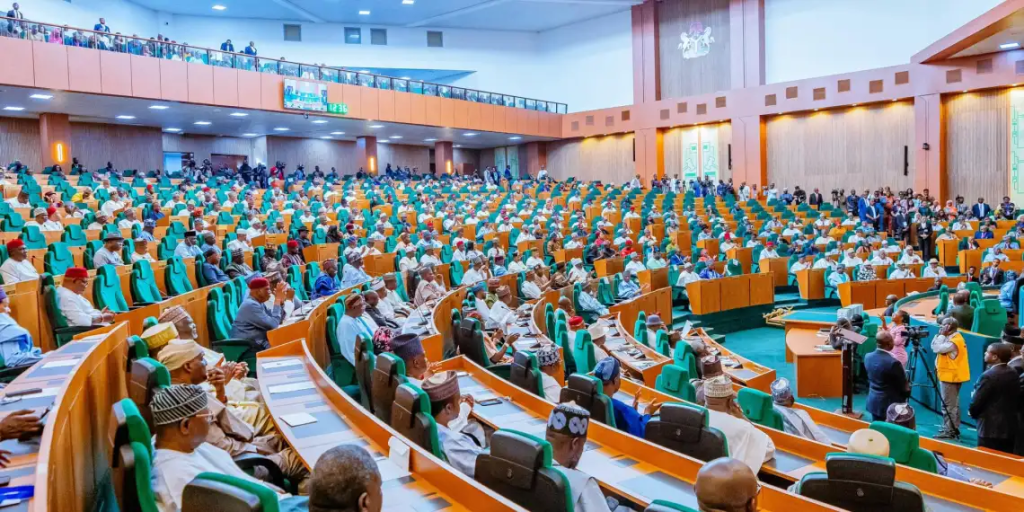
A plenary session of the House of Reps (PHOTO CREDIT: @HouseNGR)
The House of Representatives has expressed strong concern over a bill recently introduced in the United States Senate seeking to designate Nigeria as a “Country of Particular Concern” (CPC) for alleged violations of religious freedom.
The motion, moved under Matters of Urgent Public Importance by Deputy Speaker Benjamin Kalu on Wednesday, called for a coordinated diplomatic and domestic response to what he described as a “mischaracterisation of Nigeria’s complex security and religious freedom landscape.”
The motion is titled “Urgent Need for a Coordinated Diplomatic and Domestic Response to the Proposed Nigeria Religious Freedom Accountability Act of 2025 (US Senate Bill S.2747) and to Mischaracterizations of Nigeria’s Security and Religious-Freedom Landscape.”
Mr Kalu informed lawmakers that on 9 September 2025, a bill titled Nigeria Religious Freedom Accountability Act (S. 2747) was introduced in the U.S. Senate. The proposed legislation, sponsored by Senator Ted Cruz and co-sponsored by other American lawmakers, directs the U.S. Secretary of State to classify Nigeria as a Country of Particular Concern under the International Religious Freedom Act (IRFA).
If passed, the bill could subject Nigeria and certain officials to potential sanctions under Executive Order 13818 and the Global Magnitsky Human Rights Accountability Act, which target individuals accused of corruption or human rights abuses.
Mr Kalu argued that the proposed designation was “unjustified and potentially damaging,” warning that such unilateral action could undermine Nigeria’s sovereignty and distort global perceptions of its internal security situation.
“This proposed U.S. legislation is based on incomplete and de-contextualised assessments,” Kalu said.
“Nigeria’s insecurity is complex and multi-causal—driven by insurgency, criminal banditry, farmer–herder conflicts, separatist agitations, and communal disputes that affect citizens of all faiths.”
He added that Nigeria’s Constitution guarantees freedom of thought, conscience, and religion while prohibiting the adoption of any state religion. He also cited recent efforts by successive administrations, security agencies, and religious leaders to promote tolerance and prosecute offenders, facts acknowledged even in the U.S. State Department’s 2023 Human Rights Report on Nigeria.
The Nigeria Religious Freedom Accountability Act of 2025 seeks to mandate the U.S. government to identify Nigerian officials involved in enforcing blasphemy laws and to sanction them.
The proposal reportedly draws inspiration from repeated recommendations by the U.S. Commission on International Religious Freedom (USCIRF), which has urged the U.S. State Department to classify Nigeria as a Country of Particular Concern for years.
USCIRF’s reports accuse Nigerian authorities of failing to protect religious minorities and punish perpetrators of religious violence. However, Nigerian officials have consistently described such claims as misleading, insisting that most violence in the country stems from terrorism, banditry, and local disputes—not religious persecution.
During the debate, lawmakers rallied behind the Deputy Speaker’s motion, rejecting the U.S. Senate bill as a product of “faulty assumptions” and “one-sided narratives.”
The Chairperson of the House Committee on Foreign Affairs, Oluwole Oke, revealed that the bill had been under consideration in the U.S. Congress for some time and that a public hearing had been conducted without the participation of Nigeria’s diplomatic mission in Washington.
“They denied our Nigerian mission and other Nigerians audience and participation,” Oke said.
“This is a deliberate attempt to damage Nigeria’s image. We do not have a religious crisis—our challenges are criminal and economic.”
He urged the National Assembly to adopt a unified front in addressing the issue and to work closely with the Nigerian Senate for a common diplomatic position.
Another lawmaker, Sada Soli (APC, Katsina), called for stronger parliamentary diplomacy to engage directly with the U.S. Congress.
“This is the moment for this Parliament to re-engineer its parliamentary diplomacy,” he said.
“Nigeria remains a strategic partner to the United States. What we are facing now is global politics, and we must respond with facts and effective engagement.”
Soli recalled that in 2015, when the U.S. National Security Council predicted that Nigeria would become a failed state, the National Assembly sent delegations to Washington to counter the narrative—an effort that eventually led to the report being disowned.
Similarly, Billy Osawaru (APC, Edo) decried Nigeria’s current lack of a substantive ambassador to the U.S. and a permanent representative to the United Nations, arguing that such diplomatic gaps weaken Nigeria’s ability to respond effectively to global developments.
“If we don’t have proper diplomatic channels and recognised envoys in Washington and New York, our voices will not be heard,” he said.
“We must use our Nigeria–U.S. Parliamentary Friendship Group to engage the American Congress.”
Osawaru further warned that the U.S. bill could set a dangerous precedent for other African nations if left unchallenged.
“If this bill sails through, Nigeria will be the first, but not the last African country to be so designated. We must not fail Nigeria, and we must not fail Africa,” he warned.
Following extensive debate, the House of Representatives adopted key resolutions:
The resolution will also be transmitted to the Presidency, the Federal Ministry of Foreign Affairs, the U.S. Congress Leadership, the African Union, and the ECOWAS Commission.